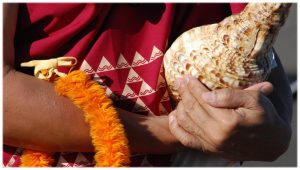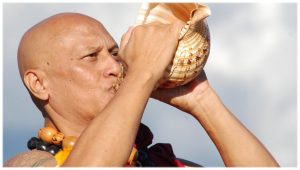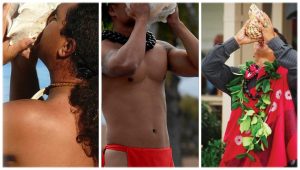
In more modern times, it calls a gathering to attention at the beginning of an event, blesses a home, or begins a wedding ceremony.
The use of the pū is an ancient custom. It sends out a sound that has echoes from the past. A fluid marker of essential moments, it is a thread that is woven throughout the lives of those who grew up with its haunting and powerful sound.
With a single, expressive note…
… it connects all the joys and sorrows from yesterday to today, calling forth the past, present, and future. This sound of the pū can serve as the trumpets announcing the arrival of the king or be a type of spiritual silence in one forlorn note. It summons a time of respect and significance for people far and wide across the planet.
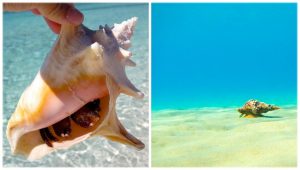
The sound of the pū is heard all across the thousands of Pacific Islands. You can hear it anywhere the large snail shells called Triton or the conch shells are found.
The act of Blowing Shells has different names across the world:
- India is Shanka
- Tibet is Dung-dhar
- Mayan Culture is Quiquizoani
- Korean is Nagak
- Japan is Horagai
Around 300 BC, in the Greco-Roman era, the large conch shell was named after Triton, the fish-tailed, Mer-man, Demi-God of the Sea. Triton, who was the Son of the main God of the Sea, Poseidon, used to blow the conch to calm the waves.
In Hawai’i, there is a strict protocol that comes with the honor of blowing the pū.
 Start, facing East:
Start, facing East:
- East – toward the sunrise where a new day begins with infinite possibilities
- West – where the sun sets after a productive day filled with success in our achievements
- North – to give thanks to the North Star, who guides us
- South – an acknowledgment of the people from the South, our forebears who journeyed to Hawai’i
- Upward – We honor Ke Akua and the people who surround us
Hawaii’s Iconic Pū Blower – Richard “Babe” Bell
For 51 years, every day, you could hear the sound of the pū at sunset at the Ilikai Hotel in Waikīkī*.
Babe has been seen and heard by thousands throughout the years. His reach goes far beyond his nightly sunset ritual, which included lighting the torches fronting the water as night fell.
A poised, regal figure, wearing the traditional malo* and kīhei*, Babe Bell has been there, whenever blowing of the pū was needed.
He has been at ceremonies and events at ‘Iolani Palace* or with hālau hula*. He was there for the departures and arrivals of the great, sea-faring Hawaiian canoe, the Hokule’a, before and after her trips sailing around the world.
His blowing of the conch was the greeting heard by the Emperor and Empress Akihito of Japan, who visited Hawai‘i in 2009. He blew a mournful pū during the traditional Hawaiian send-off to Hawaii’s beloved Israel Kamakawiwo‘ole after the singer died in 1997. After the blowing of the conch, 100s of paddlers and canoes entered the sea to honor Braddah Iz.
These are the places and events, throughout the years that the legendary Babe Bell, skillfully shared his mana*.
Next time you are here in the islands …
… remember the eons of history embedded in the simple act of blowing the conch. The centuries of people just like you, living on these beautiful lands, who would blow the pū at sunset for all the many reasons we have shared.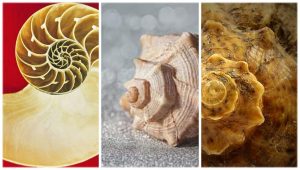
Maybe you’re walking along the shoreline and happen across a Hawaiian Wedding where the bride is called forth with the pū.
Or, on a more somber note, you come across a memorial service and scattering of a loved one’s ashes into the sea from the Hawaiian canoes. You hear the pū as it beckons the ancestors’ spirits to bring their loved one home.
 Each of these ceremonies begins with the blowing of the pū. Whatever the occasion, allow yourself a moment of silence and reflection to appreciate being exactly where you are in this special place.
Each of these ceremonies begins with the blowing of the pū. Whatever the occasion, allow yourself a moment of silence and reflection to appreciate being exactly where you are in this special place.
Writing and Graphic Design by Sugandha Ferro Black
GLOSSARY* of Hawaiian Words
Ali’i – king, queen, chief or royalty
Hālau hula – hula school
Ilikai – horizon, surface of the sea
‘Iolani Palace – the ONLY Royal palace in the USA, ʻIolani Palace was the royal residence of the rulers of the Kingdom of Hawaii.
Ke Akua – The Gods, Goddesses or exalted spirits
Kīhei – shoulder wrap, now days used for ceremonies, hula and protocol events
Malo – male loincloth
Mana – to have or occupy the position of power, divine power, voice of authority
Pū – conch or Triton shell
Waikīkī – lit. spouting water or place name in Honolulu
*Please keep in mind that all Hawaiian Words have many meanings. The meanings we share here are the specific translations for the words as they pertain to this particular blog’s subject matter.
Photos courtesy of paid for or free sources unless otherwise noted.
